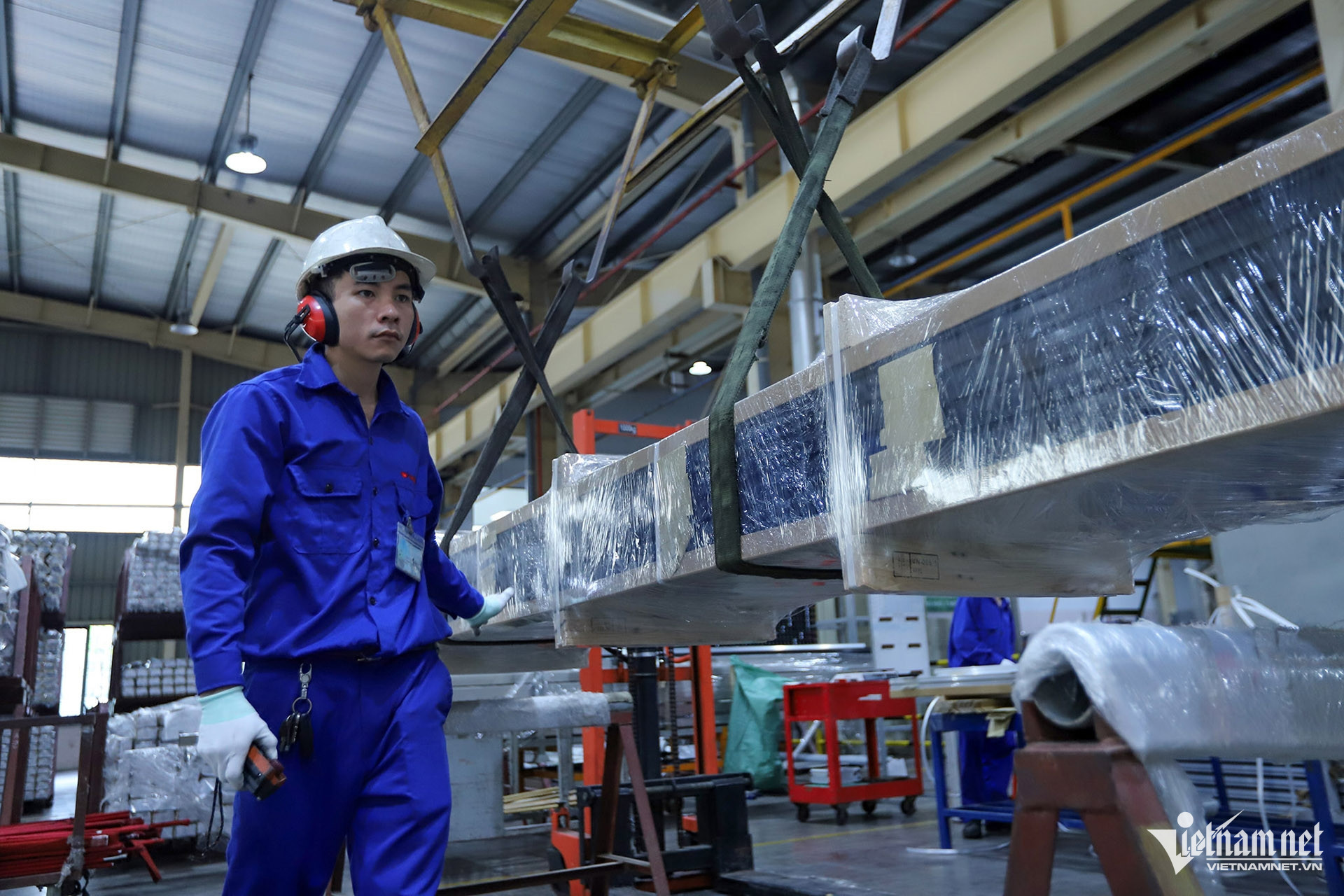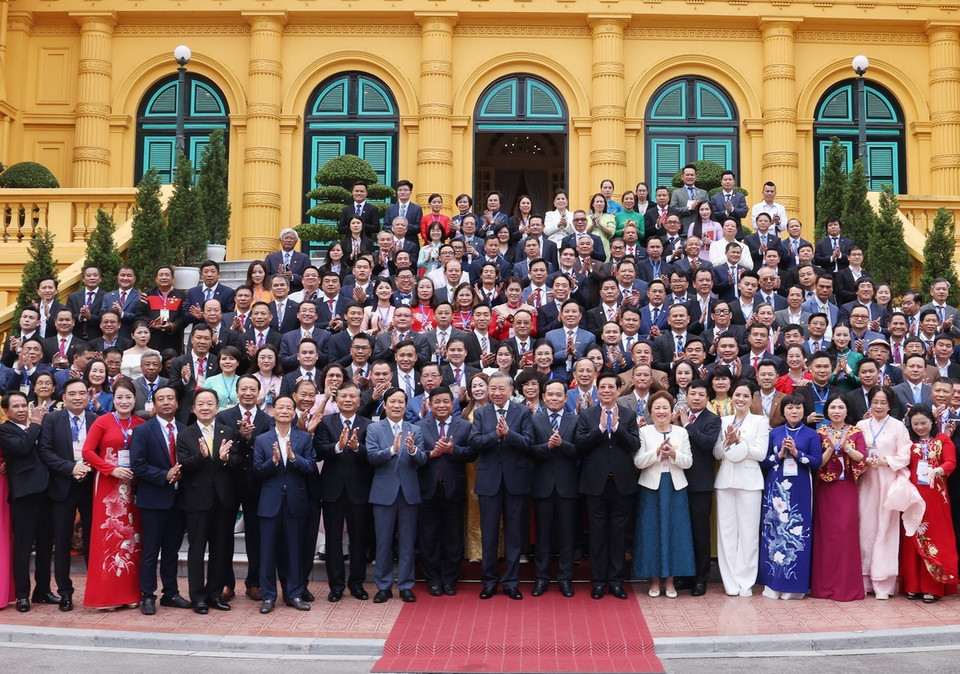1. Firmly upholding national independence in line with socialism has been the wise and correct choice of our Party since its inception. This consistent path has been the fundamental reason for Vietnam’s successes in national liberation, unification, and today’s efforts in building and safeguarding the nation.
The socialism that we aim to build, as emphasized by President Ho Chi Minh, means "a wealthy people and a strong country" - characterized by prosperity, democracy, justice, and civilization. It is governed by the people, with a highly developed economy based on modern productive forces and progressive production relations. It features an advanced culture deeply rooted in national identity, where all ethnic groups live equally and in solidarity, and where people enjoy material well-being, freedom, happiness, and comprehensive development. It also has a socialist rule-of-law state led by the Communist Party of Vietnam, and maintains cooperative and friendly relations with other nations.

According to Marxist-Leninist theory, material production is the foundational activity driving social change. Human productivity, cooperation, and competition in production spur societal progress and transformation. Marx noted that social transformation essentially stems from the transformation of material production, which influences economic structures and, in turn, social values and norms.
From the basic truth that humans must produce to survive - before engaging in politics, religion, or philosophy - Marx showed that material production is essential to human existence and social evolution. Different economic eras are defined not by what is produced, but by how it is produced and with what tools.
Lenin further argued that higher labor productivity is socialism’s greatest advantage over capitalism. It is the most vital criterion for the victory of the socialist system, as socialism can surpass capitalism only by generating significantly higher productivity.
To successfully build socialism, as outlined in the Party’s 2011 Platform on National Construction during the Transitional Period, human material production must remain central. High labor productivity is the key factor that enables the development of a socialist economy, transforms society positively, and fosters a new socialist citizenry with prosperity and freedom. This progression will complete the transition to socialism and move toward the advanced stage of communist society, where, as Marx envisioned in his Critique of the Gotha Programme, wealth is abundant and society operates on the principle of “from each according to his ability, to each according to his need.”
2. Lessons from economic development in China, Russia, and 40 years of renewal in Vietnam underscore the importance of private economic growth. In Russia, even under a planned economy, Lenin’s New Economic Policy from 1921 to 1991 fostered private-sector growth, turning the Soviet Union into a powerhouse in energy, industry, and space.
In China, economic reforms began with the “Open Door” policy in 1978. Constitutional amendments in 1988 strengthened the protection of private enterprises, with the 1997 Communist Party Congress affirming the private sector as a core part of the socialist market economy. Today, Chinese private firms dominate industries like technology and e-commerce, contributing over 60% of GDP, 80% of urban employment, and more than 70% of innovations.
Vietnam, too, has embraced the private sector. Since the 6th Party Congress recognized a multi-sector economy, successive congresses have affirmed and strengthened the role of private enterprise. Key milestones include recognizing private capitalism as a long-term component of the socialist-oriented market economy, adopting a dedicated resolution to foster the private sector, and enabling Party members to engage in private business.
Once marginalized and restricted, the private sector has now grown rapidly - contributing significantly to state revenue, job creation, and national economic growth, while bolstering defense, security, and international integration.
With the right vision and policies, developing the private sector is a strategic choice to boost production, drive societal change, enhance technology and training, increase capital absorption, and raise productivity. The central issue is further institutional reform - shifting the socialist-oriented market economy to one led by the State under the Party’s leadership, with transformative changes in mindset, perception, and policy execution.

3. On May 4, 2025, the Politburo issued Resolution No. 68-NQ/TW on developing the private economy. It sets unprecedented goals and solutions, establishing a new Party perspective that positions private enterprise as a vital engine of economic growth.
To effectively implement Resolution 68, several urgent actions are needed:
First, rigorously and efficiently execute the resolution in practice. At the 9th session of the 15th National Assembly, lawmakers will adopt a resolution on private economic development with concrete, feasible incentives. A national steering committee, led by the Prime Minister, will monitor implementation monthly, preventing policy fragmentation or inconsistency.
Progress must be transparent and serve as a performance metric, especially for leadership roles. Administrative thinking must shift from control to collaboration - treating enterprises as partners to support, not regulate. The government will issue a directive to move administrative procedures to post-audit systems (except in areas like security and defense). Investment licensing will be digitized and accelerated, and local leaders will be held accountable for business support, linked to reward and discipline mechanisms.

Second, urgently translate Party principles into enforceable laws. A Private Economic Development Law should be created, alongside amendments to existing laws, ensuring all of Resolution 68’s tenets are fully institutionalized.
This includes creating fair competition, eliminating discriminatory practices, encouraging investment, and establishing financial systems tailored to private firms. It should also incentivize private-led innovation, research hubs, and national priority projects.
Clear distinctions between civil disputes and criminal offenses must be codified, outlawing misuse of legal mechanisms in market regulation. Support services and streamlined procedures should follow. The Penal Code must differentiate between fraud and administrative errors.
Third, provide targeted support for small and micro businesses, promoting a startup culture focused on innovation. A dedicated credit package should be rolled out via state-backed guarantees. Industrial parks must allocate 5–10% of land to startups at preferential rates. A national legal sandbox should enable trial runs for fintech, AI, and digital agriculture. Local legal aid centers must be established to assist SMEs.
Fourth, build an entrepreneurial class that serves as “economic warriors” and plays a real role in policymaking. Entrepreneurs with patriotism, legal integrity, and development ambition should be honored and supported. These individuals must also be equipped with management expertise and social responsibility.
Business voices must be heard in lawmaking. Strong, independent trade associations should receive state funding and support. A National Council of Private Entrepreneurs should be formed to advise the government on long-term economic strategies.
Vietnam’s proud traditions, theoretical and legal foundations, and unified national determination ensure that, with the implementation of Resolution 68, the private sector will rise to become a core driver of economic strength and national prosperity. Together, we will fulfill the vision of a socialist Vietnam that is wealthy, strong, democratic, just, and civilized.
General Secretary To Lam